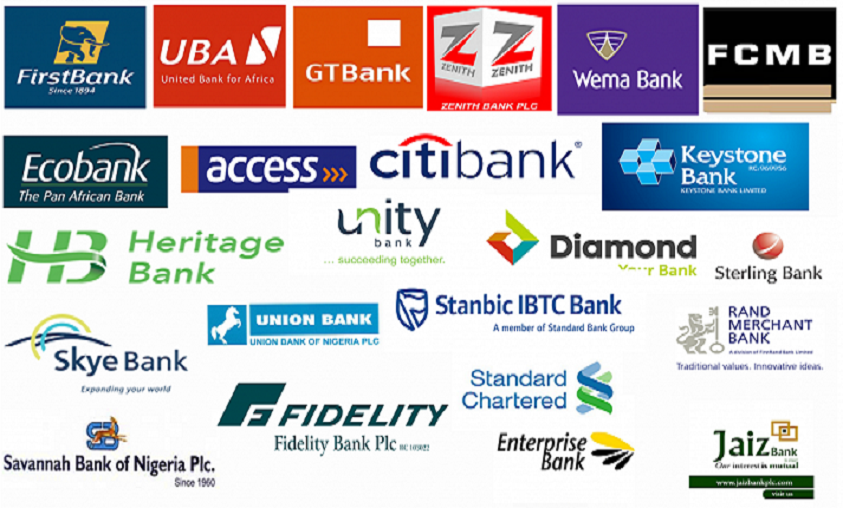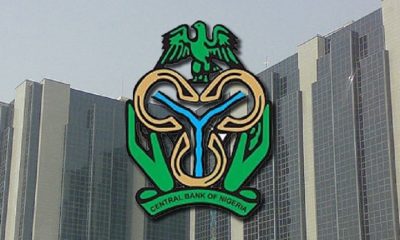Banking
Nigerian Banks’ Earnings, NPL Risk Still Under Pressure—Moody’s

By Modupe Gbadeyanka
Renowned global credit rating company, Moody’s, has warned that the earnings and Non-Performing Loans (NPLs) of banks operating in Nigeria are still under pressure despite having outlook as an improving operating environment.
In its latest outlook for the nation’s banking sector, Moody’s said, “Nigerian banks’ profitability will nevertheless decline on account of lower yields on government securities, as well as a likely reduction in income from derivatives.”
In the report released yesterday, the rating agency said explained that outlook for the Nigerian banking system remains stable as their foreign currency liquidity risks moderate due to rising oil prices and a more liberal foreign exchange policy.
Business Post reports that the yields on Treasury bills (T-bills) have been declining in recent months as major economic indicators turn positive. The yields have dropped from over 18 percent in the last one year to 10.60 percent as at Wednesday.
Likewise, returns on Federal Government of Nigeria (FGN) Bonds have also nosedived to around 13 percent from over 14 percent previously.
Analysts explained that as the economy recovers and attracts more confidence of foreign investors, earnings on government securities drop.
This is supported by recovering global oil prices and a more liberal foreign exchange market.
However, Moody’s expects banks’ earnings to come under pressure, capital metrics to decline marginally, and asset quality to remain weak between the next 12-18 months, resulting from declining yields on government securities, the introduction of new IFRS 9 accounting standards, and increase in NPLs of the banks.
“Operating conditions for the Nigeria’s banks will continue to gradually improve over the next 12 to 18 months, but remain challenging,” the Vice President and Senior Credit Officer at Moody’s, Mr Akin Majekodunmi, disclosed at a conference in Lagos.
“Nigeria’s growth prospects remain vulnerable to global oil prices, as crude oil will remain the nation’s largest export commodity and its main generator of foreign currency for the foreseeable future,” he added.
However, Moody’s expects the pressure on the Nigerian banks’ profitability to be offset partially by a recovery in loan growth and transaction income from the expansion of digital platforms, and the ease of foreign currency shortages.
Foreign currency loans accounted for 40.7 percent of the system wide loan book at the end of the third quarter of 2017, down from 50 percent at year-end 2016.
A significant proportion, some 10 percent to 20 percent, has been dispersed to borrowers with little or no foreign currency income.
These borrowers are vulnerable to fluctuations in the naira/dollar exchange rate as a depreciation of the naira reduces their repayment capacity, Moody’s said.
Moody’s conducted a scenario analysis to gauge the solvency of banks under both a base-case and a low-probability highly stressed scenario that is roughly equivalent to a 1-in-25 year event.
“Under our base-case (or most likely) scenario, we expect the system-wide capital ratio to remain roughly stable over a two-year horizon. This is driven by an increase in loan losses, due to an increase in system-wide non-performing loans and in risk-weighted assets, driven by loan growth.
“This impact would be offset by pre-provision income leaving the capital ratio virtually unchanged at 17.0%,” Moody’s said.
In the report titled ‘Banking System Outlook: Nigeria,’ Moody’s forecasts a recovery in real Gross Domestic Product (GDP) growth over the next two years, up from 0.8 percent last year, helping lending growth rise to around 10 percent after a 15.4 percent contraction in 2017.
On the weakening of asset risk, Moody’s expects only a moderate deterioration in loan performance given the lagging effect of subdued economic growth – continued asset risk vulnerability from banks’ large exposures to the oil and gas sector and foreign currency borrowers in general capital weakening .
The banks’ capital levels are projected by the rating body to decline moderately on account of the introduction of IFRS 9. While it expects provisioning costs to be absorbed by pre-provision income.
On the stability of funding and liquidity, the Banks are projected to continue to benefit from stable deposit funding and solid liquidity buffers in local currency.
The agency also expects banking system income to be supported by both a recovery in loan growth to 10 percent over 2018 and an increase in noninterest income/transactional income through the promotion of e-banking platforms.
Banking
All Set for Second HerFidelity Apprenticeship Programme

By Modupe Gbadeyanka
Registration for the second HerFidelity Apprenticeship Programme (HAP 2.0) organised by Fidelity Bank Plc has commenced.
The Divisional Head of Product Development at Fidelity Bank, Mr Osita Ede, informed newsmen that the initiative was designed to empower women with sustainable entrepreneurship skills.
The lender created the flagship women-empowerment initiative to equip women with practical, income‑generating skills and structured pathways to entrepreneurship.
“HerFidelity Apprenticeship Programme 2.0 reflects our commitment to continuous improvement. Having evaluated feedback from the first edition, we have returned with stronger partnerships and deeper mentorship programmes to ensure that women acquire not just skills, but sustainable economic opportunities,” he said.
“At the heart of the programme is guided, real‑world learning. Participants will undergo intensive apprenticeship training under reputable institutions and industry experts across select fields such as hair styling, shoe making, auto mechatronics, and interior decoration,” Mr Ede added.
He noted that HerFidelity Apprenticeship Programme 2.0 goes beyond skills acquisition by offering participants a wide range of business advisory services. These include business and financial literacy training, mentorship support throughout the apprenticeship journey, access to Fidelity Bank’s women‑focused and SME financial solutions, as well as guidance on business formalisation and growth strategies.
Further emphasising the bank’s vision, Mr Ede said, “By integrating structured mentorship with entrepreneurial development, Fidelity Bank is positioning women not just as trainees, but as future employers, innovators, and economic contributors within their communities. This aligns with our mandate to help individuals grow, businesses thrive, and economies prosper.”
Banking
The Alternative Bank Opens New Branch in Ondo

By Modupe Gbadeyanka
A new branch of The Alternative Bank (AltBank) has been opened in Ondo State as part of the expansion drive of the financial institution.
A statement from the company disclosed that the new branch would support export-oriented agribusinesses through Letters of Credit and commodity-backed trade finance, ensuring that local producers can scale beyond state borders.
For SMEs, the bank is introducing robust payment rails, asset financing for equipment and inventory, and supply chain-backed facilities that strengthen working capital without trapping businesses in interest-based debt cycles.
The Governor of Ondo State, Mr Lucky Aiyedatiwa, represented by his Chief of
Staff, Mr Olusegun Omojuwa, at the commissioning of the branch, underscored the importance of financial institutions in economic development.
“The pivotal role of financial institutions to economic growth and development of any economy cannot be overemphasised. It provides access to capital, supporting small and medium-scale enterprises and encouraging savings.
“Therefore, I have no doubt in my mind that the presence of The Alternative Bank in Ondo State will deepen financial services, create employment opportunities and stimulate economic activities across various sectors,” he said.
In her remarks, the Executive Director for Commercial and Institutional Banking (Lagos and South West) at The Alternative Bank, Mrs Korede Demola-Adeniyi, commended the state government’s leadership and outlined the lender’s long-term vision for Ondo State.
“As Ondo State steps into its next fifty years, and into the future anchored on the sustainable development championed during the recent anniversary celebrations, The Alternative Bank is here to be the financial engine for that vision. We didn’t come to Akure to hang banners. We came to fund work, farms, shops, and factories.”
With Ondo State’s economy anchored largely on agriculture, particularly cocoa production, poultry farming, and other cash crops, alongside a growing SME and trade ecosystem, AltBank is deploying sector-specific financing solutions tailored to these strengths.
For cocoa aggregators, processors and poultry operators, the bank will provide production financing, facility expansion support, machinery lease structures, and structured trade facilities under its joint venture and cost-plus financing models, with transaction cycles of up to 180 days for commodity trades and longer-term structured asset financing for equipment and infrastructure.
The organisation is a notable national non-interest bank with a physical network now surpassing 170 locations, deploying capital to solve real-world challenges through initiatives such as the Mata Zalla project, which saw to the training of hundreds of women as electric tricycle drivers and mechanics.
Banking
Recapitalisation: 20 Nigerian Banks Now Fully Compliant—Cardoso

By Adedapo Adesanya
The Governor of the Central Bank of Nigeria (CBN), Mr Yemi Cardoso, announced on Tuesday that the country’s banking sector is making strong progress in the recapitalisation drive, with 20 banks now fully compliant.
Mr Cardoso disclosed this during a press conference at the first Monetary Policy Committee (MPC) meeting of 2026, where he also highlighted positive developments in the nation’s foreign reserves.
On March 28, 2024, the apex bank announced an increase in the minimum capital requirements for commercial banks with international licences to N500 billion.
National and regional financial institutions’ capital bases were pegged at N200 billion and N50 billion, respectively.
Also, CBN raised the merchant bank minimum capital requirement to N50 billion for national licence holders.
The banking regulator said the new capital base for national and regional non-interest banks is N20 billion and N10 billion, respectively.
To meet the minimum capital requirements, CBN advised banks to consider the injection of “fresh equity capital through private placements, rights issue and/or offer for subscription”.
Following the development, several banks announced plans to raise funds through share and bond issuances.
In January, Zenith Bank said it had raised N350.46 billion through rights issue and public offer to meet the CBN minimum capital requirement.
Guaranty Trust Holding Company Plc (GTCO), on July 4, said it had successfully priced its fully marketed offering on the London Stock Exchange (LSE).
In September, the CBN governor said 14 banks fully met their recapitalisation requirements — up from eight banks in July.
With one month to the central bank’s March 31, 2026, recapitalisation deadline, 13 Nigerian lenders are yet to cross the finish line.
Additionally, the governor noted that 33 banks have raised funds as part of the ongoing recapitalisation exercise, signalling robust capital mobilisation across the sector.
He stated that gross foreign reserves have climbed to a 13-year high of $50.4 billion as of mid-February 2026.
-

 Feature/OPED6 years ago
Feature/OPED6 years agoDavos was Different this year
-
Travel/Tourism10 years ago
Lagos Seals Western Lodge Hotel In Ikorodu
-

 Showbiz3 years ago
Showbiz3 years agoEstranged Lover Releases Videos of Empress Njamah Bathing
-

 Banking8 years ago
Banking8 years agoSort Codes of GTBank Branches in Nigeria
-

 Economy3 years ago
Economy3 years agoSubsidy Removal: CNG at N130 Per Litre Cheaper Than Petrol—IPMAN
-

 Banking3 years ago
Banking3 years agoSort Codes of UBA Branches in Nigeria
-

 Banking3 years ago
Banking3 years agoFirst Bank Announces Planned Downtime
-

 Sports3 years ago
Sports3 years agoHighest Paid Nigerian Footballer – How Much Do Nigerian Footballers Earn






















